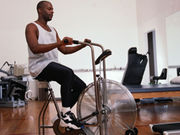Slower declines in health-related quality of life, mobility for increasing exercise by 30 minutes/week
TUESDAY, March 28, 2017 (HealthDay News) — For patients with Parkinson’s disease (PD), regular exercise is associated with significant positive effects on health-related quality of life (HRQL), especially in advanced PD, according to a study published recently in the Journal of Parkinson’s Disease.
Miriam R. Rafferty, Ph.D., from Northwestern University in Chicago, and colleagues identified a cohort of 3,408 National Parkinson Foundation Quality Improvement Initiative participants with three visits, and compared HRQL and mobility between self-reported regular exercisers and patients who did not exercise. The changes in HRQL and mobility associated with 30-minute increases in exercise were quantified across PD severity.
The researchers found that, compared with non-exercisers, consistent exercisers and patients who started to exercise regularly after their baseline visit had smaller declines in HRQL and mobility after two years (P < 0.05). Per-year, non-exercisers had worsening of 1.37 points on the Parkinson’s Disease Questionnaire and 0.47 seconds on the Timed Up and Go. Sower declines in HRQL and mobility were seen for increasing exercise by 30 minutes/week (−0.16 points and −0.04 seconds, respectively). In advanced versus mild PD, the benefit of exercise was greater on HRQL (−0.41 versus −0.14 points; P < 0.02).
“Consistently exercising and starting regular exercise after baseline were associated with small but significant positive effects on HRQL and mobility changes over two years,” the authors write.
Copyright © 2017 HealthDay. All rights reserved.








